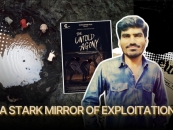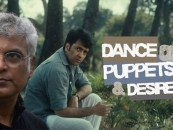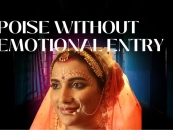Call it a coincidence or plain copycatting. Film historian, Dhruv Somani, writes on the curious clashes between Bollywood filmmakers who have tackled the same subject or storyline simultaneously.
‘Great minds think alike’ goes a proverb. When applied to Bollywood, it can spark major controversies. Down the decades then, we have witnessed the acrimony between filmmakers who somehow simultaneously land up working on a similar theme or storyline.
Occasionally, producers have scrapped projects to avoid a clash. More frequently, throwing caution to the wind and to assert their ego, films narrating the same story, have been released, thereby eating into one another’s ticket sales. By the way, copyrights are a dodgy issue, since the tendency is to avoid prolonged court cases. So the wheel of ‘thinking alike’ spins on.
For example, there was a face-off between Nishtha Jain’s documentary Gulabi Gang (2012) on Sampat Pal Devi, founder of the vigilante movement in Bundelkhand Uttar Pradesh and Madhya Pradesh. Quick on its heels, came Soumik Sen’s Gulaab Gang featuring Madhuri Dixit and Juhi Chawla, which may have picked up a National Award for the Best Film on Social Issues but was a downer at the box office.
For this Sunday, here’s a pick of 10 instances of films, which faced the same ‘copycat’ dilemma:
Jyoti Bane Jwala versus Jwalamukhi (1980):
.jpg)
Jyoti Bane Jwala starring Jeetendra was his home production co-starring Waheeda Rehman, Sarika, Vinod Mehra, Moushumi Chatterjee, and Kadar Khan. As it happened Prakash Mehra’s Jwalamukhi starring Waheeda Rehman, Shatrughan Sinha, Reena Roy, Shabana Azmi, Vinod Mehra and Kader Khan had a similar story. Waheeda Rehman, Kader Khan and Vinod Mehra were the common actors in both the projects.
Prakash Mehra would often inquire about the status and progress of his competitor from Vinod Mehra, which would make the actor uncomfortable at times. Jyoti Bane Jwala released first and proved to be successful while Jwalamukhi was delayed because of the disappearance of its heroine Parveen Babi. Reena Roy replaced her but it was much too late. The outcome tanked.
Inquilaab versus Aaj Ka M.L.A Ram Avatar versus Yeh Desh (1984):
.jpg)
Inspired by the Telugu film Eenadu (1982), all the three were based on the theme of political corruption. Director T. Ramarao directed both Inquilaab and Yeh Desh. Hyderabad’s Padmalaya Banner was upset with him for giving preferential treatment to Inquilaab starring Amitabh Bachchan and Sridevi over Yeh Desh top-lining Jeetendra and Zeenat Aman (again brought in after the disappearance of Parveen Babi).
As for Aaj Ka M.L.A. Ram Avatar, with Rajesh Khanna, Shatrughan Sinha and Shabana Azmi, Dasari Narayana Rao directed it. There was a three-legged race of sorts to reach the finishing line. No point. Inquilaab released first but the masses as well as the mandarins thumbed all the three down.
Khooni Murdaa (1989) versus Mahakaal (1994):
.jpg)
Mahakaal from the Ramsay Banner starred Karan Shah, Archana Puran Singh and Kunika. Rival director Mohan Bhakri began Khooni Murdaa starring Deepak Parashar, Javed Khan, Sriprada, Shagufta Ali and Kiran Kumar around the same time.
Both were inspired by Hollywood’s horror classic Nightmare on Elm Street, even carbon copying some of its scenes brazenly. Khooni Murdaa released first. The Ramsays smartly staggered the release of Mahakaal right to 1994. Both the desi Nightmares were hits.
Heer Raanjha versus Mehboob Mere Mehboob versus Ishq Khuda Hai (1992):
.jpg)
All the three, launched around the same time, were inspired by the legendary love story of Heer Raanjha, which had already been poetically rendered by Chetan Anand with Raaj Kumar and Priya Rajvansh.
P.D. Mehra’s Ishq Khuda Hai, duo Gurdip Singh-Ramanjit Juneja’s Mehboob Mere Mehboob, and Harmesh Malhotra’s Heer Raanjha were all launched around the same time.
Mehboob Mere Mehboob starred debutant Boy Mukherjee, son of Joy Mukherjee opposite Mala’s Sinha’s daughter Pratibha Sinha.
Ishq Khuda Hai starred newcomers Rishabh Shukla and Surubhi supported by Asha Sachdev, Goga Kapoor and Tinnu Anand.
Heer Raanjha showcased Anil Kapoor and Sridevi, backed by Shammi Kapoor, Preeti Sapru and Anupam Kher.
All proved to be non-starters at the ticket windows. Incidentally, after the success of Sohini Mahiwal, the F.C. Mehra banner was keen to remake Heer Raanjha with Sunny Deol and Poonam Dhillon but the project went under the cracks.
Toofan versus Jaadugar (1989):
.jpg)
Amitabh Bachchan’s pet directors Manmohan Desai and Prakash Mehra launched Toofan and Jaadugar respectively. But zindagi ittefaq hai maybe… the superstar was to portray a magician in both the projects. Prakash Mehra was vocal about his disappointment and felt cheated, saying Bachchan should have informed him about the similarity.
Desai’s Toofan released first. Again this turned out to be box office poison. Both the films were duds. Not surprisingly, this was the last collaboration between Bachchan and Mehra who had given him first whopper hit Zanjeer.
The Legend of Bhagat Singh versus 23rd March 1931 Shaheed versus Shaheed-e-Azam (2002):
.jpg)
Bhagat Singh had sacrificed his life for the freedom of India from the British Raj. He was just 23 years old when he along with Sukhdev Thapar and Shivaram Rajguru were hanged on 23rd March 1931. Manoj Kumar had already portrayed him in a black-and-white biopic titled Shaheed (1965).
Evidently, the iconic freedom fighter’s had to be re-told. Rajkumar Santoshi directed the Legend of Bhagat Singh. It began with Sunny Deol but he walked out citing creative differences and was replaced with Ajay Devgn. The ensemble cast included Sushant Singh, D. Santosh, Akhilendra Mishra and Amrita Rao.
Meanwhile, 23rd March 1931 Guddu Dhanoa heading the Deol brothers directed Shaheed. Bobby played Bhagat Singh and Sunny enacted the part of Chandra Shekhar Azad. Amrita Singh was cast as Bhagat Singh’s mother.
Simultaneously, Sukumar Nair’ Shaheed-e-Azam featured the then-newcomer Sonu Sood as the martyr. Since the three films were released in very close succession, they turned out to be commercial downers. The only upper was the fact that Rajkumar Santoshi’s take was bestowed the Best Hindi Film National Award and Ajay Devgn won the Best Actor National Award.
Rahasya (2015) versus Talvar (2015):
.jpg)
Both were based on the controversial Aarushi Talwar murder case of Noida. Rahasya starring Kay Kay Menon, Tisca Chopra, Divya Dutta, Ashish Vidyarthi and Mita Vashishth released first and was followed by Talvar starring Irrfan Khan, Konkona Sen Sharma, Neeraj Kabi, Sohum Shah and Gajraj Rao.
Both the films clicked, perhaps because their directorial treatment was different. Manish Gupta’s Rahasya was designed as a whodunit while Meghna Gulzar’s Talvar, opted for a more realistic investigative style.
Khelein Hum Jee Jaan Sey versus Chittagong (2012):
.jpg)
Ashutosh Gowariker’s Khelein Hum Jee Jaan Sey based on Mohini Chatterjee’s book Do or Die - an account of the 1930s Chittagong armory raid - starred Abhishek Bachchan, Deepika Padukone, Sikandar Kher and Vishaka Singh.
Bedabtara Pain’s Chittagong, with Manoj Bajpai, Barry John, Nawazuddin Siddiqui, Raj Kumar Rao and Jaideep Alhawat, also revolved around the subject of the Chittagong Uprising. A far superior film with fine performances, its release was stalled for unknown reasons. Both the films failed to make an impact.
Qaidi Band versus Lucknow Central (2017):
.jpg)
The Yash Raj banner and Viacom both began projects which were on the same lines. Yash Raj’s Qaidi Band introduced Aadar Jain (grandson of Raj Kapoor), opposite newcomer Anya Singh.
Meanwhile Lucknow Central starred Farhan Akhtar and Deepak Dobriyal. The scripts revolved around a bunch of under-trials who form a rock band, so as to escape from jail somehow. Neither made ripples, commercially or critically.
Bala (2020) versus Ujda Chaman (2020) versus Gone Kesh (2019):
.jpg)
Premature balding was their common theme. Ayushmann Khurrana’s Bala was the most awaited among the trio but it was the Sunny Singh starrer Ujda Chaman, which released first. Its producers even slapped a legal notice on the makers of Bala as they had the official rights of the original source, the Kannada film Ondu Motteya Kathe.
Kesh Gone was a film released on a similar subject in 2019 with the main protagonist being a young woman (Shweta Tripathi) who goes bald. Of the three projects, only Bala managed to attract a semblance of public curiosity.

-853X543.jpg)




-173X130.jpg)
-173X130.jpg)

-173X130.jpg)


-173X130.jpg)
